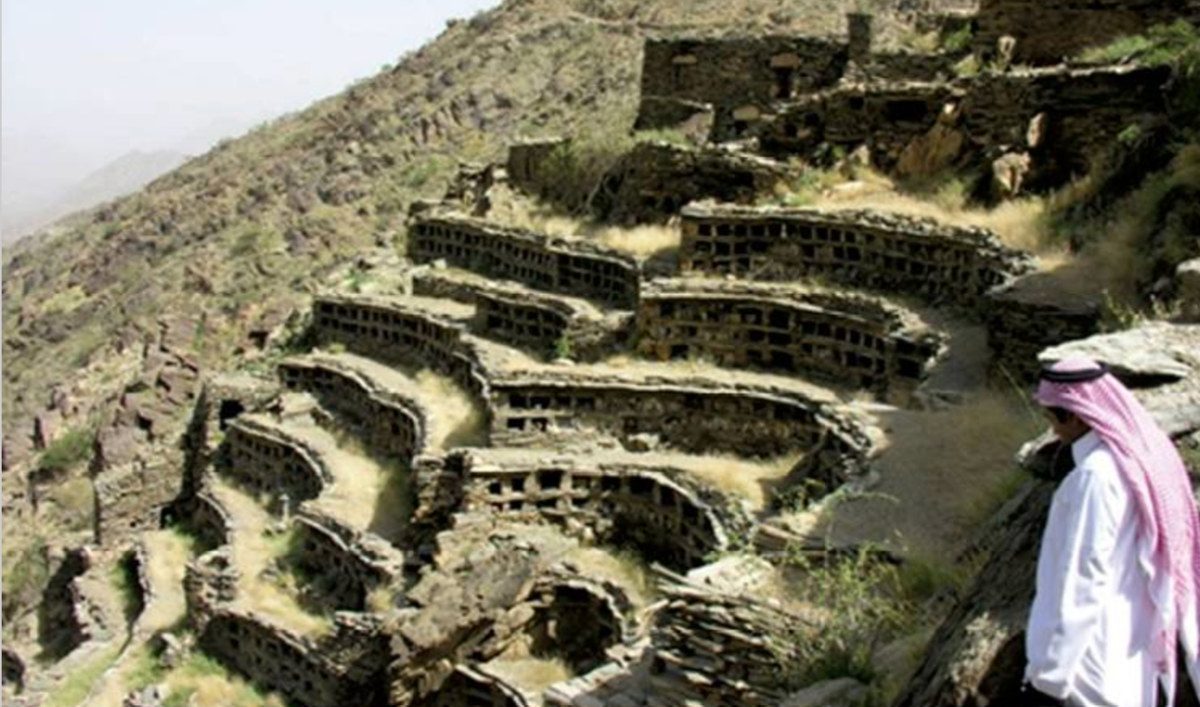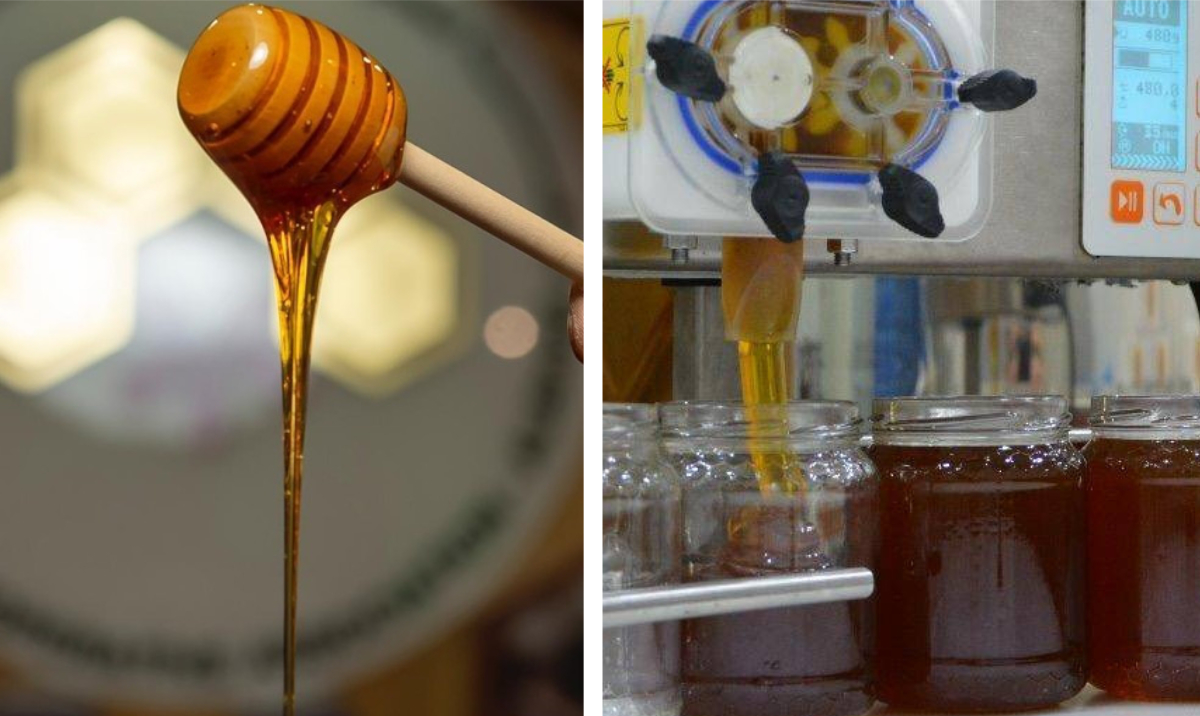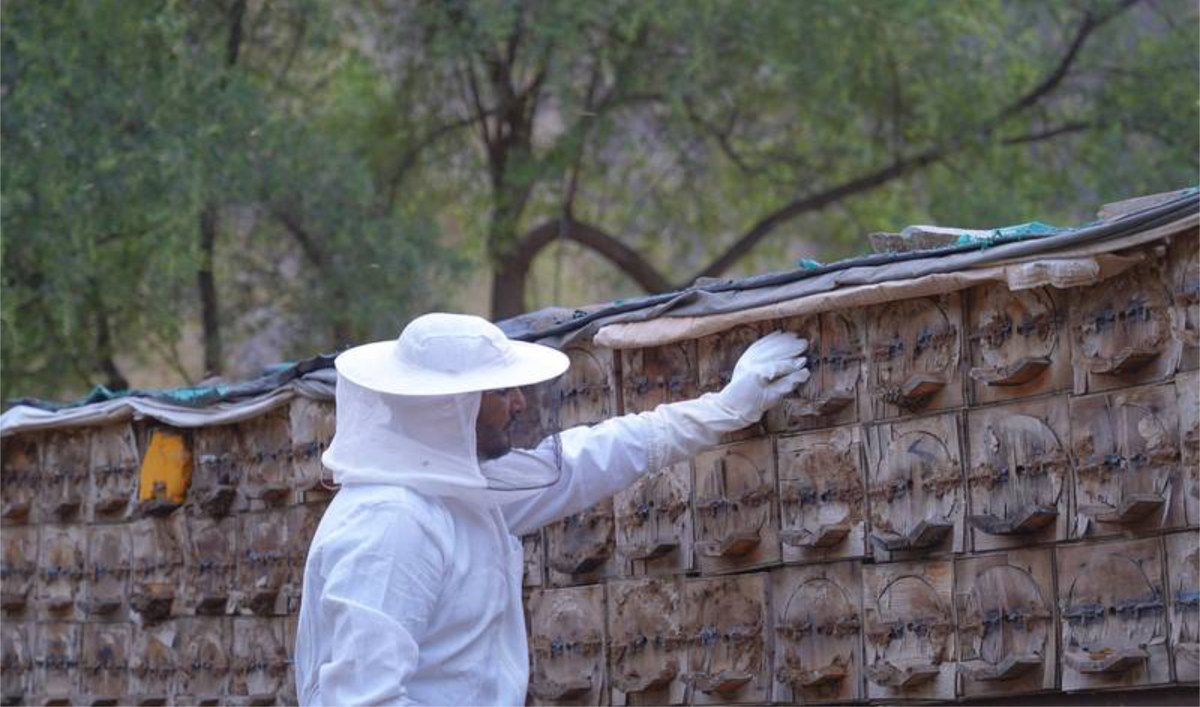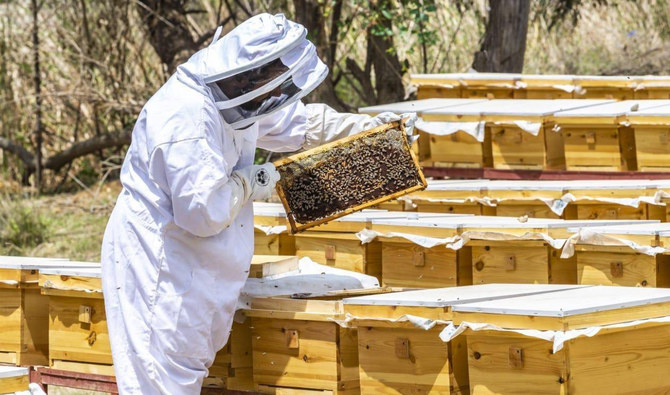JEDDAH: With talk of climate change, devastating droughts and growing concerns about the state of food systems due to continuing conflicts, it’s easy to forget the buzz surrounding one of nature’s simplest creatures and their profound role in our food chain — the bee.
Humans most often associate bees with honey. In addition to being a delicious ingredient for sweet and savory dishes, honey is used in traditional medicine to treat various conditions such as asthma, eye infections, and more. In modern medicine, researchers have noted honey’s antioxidant, antimicrobial and anti-inflammatory properties.
Honey, however, is far from the most important reason to protect bees. This is because bees play a crucial role in pollination: Nearly 75 percent of the world’s leading crops depend on animal pollination. Bees remain the most dominant pollinators of wild and crop plants.
In 2019, the UN’s Food and Agriculture Organization, or FAO, released a statement highlighting the threat that the declining number of bees and other pollinators posed to global food security and nutrition.
It is challenging to calculate the number of bees in the world; some experts believe there are at least two trillion bees worldwide, divided into seven families and about 20,000 species. Other experts believe there are between 80 million to 100 million beehives worldwide, with a single bee colony containing 10,000 to 60,000 bees.

Bees are irreplaceable as pollinators of many plants that simply would not survive without them. While the insects are reared primarily for their honey, not all of them produce it, and their decline could have a major impact on the planet’s biodiversity. The FAO also noted how declining bee populations could affect nutritious crops such as fruits, nuts and vegetables, which would then be substituted by staple crops such as rice, corn and potatoes, resulting in an imbalanced diet.
Researchers believe that the headlines of honey bee colony losses have given an impression of the large-scale global decline of the bee population that endangers beekeeping. However, the stories are usually based on research reports limited to a few countries with observations over a relatively short period, such as the US and Europe, where colony losses have been particularly evident during several harsh winters.
Though bees have stood the test of time for hundreds of millions of years as their populations varied, over the past few decades, the fluctuating decline in numbers may also be attributed to poor farming practices, global warming and disease.
Realizing the possible harsh impact the decline of bees can have on crop yields, the beekeeping industry is steadily growing around the world, and the Kingdom is no exception. Though Saudi Arabia’s arid landscape may seem an inhospitable location for beekeeping and honey-making, the practice has been passed down from generation to generation for centuries.
The bee species most prevalent in the Kingdom is the indigenous honey bee, Apis mellifera dementia, which is found mainly in the southern and southwestern regions of the Kingdom, an ideal environment for nature’s cultivators.

Beekeepers in Asir embark on seasonal honey journey. (SPA)
The southwestern region of Asir and Albaha in particular is famous for producing the highest quality honey. Beekeepers there benefit greatly from its climate and diverse flora, which helps honey bees extract nectar to create honey of high nutritional value. Both regions are also known to have some of the most fertile soil in the Kingdom. The existence of bees and the preservation of the species is essential for the region’s flourishing agriculture market — a win-win for farmers, bees and beekeepers alike.
The Saudi Ministry of Environment, Water and Agriculture, or MEWA, has several plans to develop the beekeeping and honey production sector through initiatives to preserve and protect local bee species, develop the productive efficiency of queens, honey production and other bee products, develop and safeguard bee pastures, and regulate their exploitation and improve quality to achieve economic and social returns.

A historical apiary with traditional hives of Saudi Apis mellifera jemenitica maintained over 500 years by the same family in Taif. (Photo credit: Abdulaziz S. Alqarni, Mohammed A. Hannan, Ayman A. Owayss, Michael S. Engel)
Beekeeping has found support from the Kingdom’s program for developing human capabilities, in line with the goals of Saudi Vision 2030, an economic diversification and social reform plan announced by Crown Prince Mohammed bin Salman in 2016. The industry is also attracting much attention due to local support of homegrown small and medium-sized enterprises.
There are about 16,000 registered beekeepers in the Kingdom, a number which is projected to reach 30,000 by 2030, with the number of beehives exceeding 1 million.
According to MEWA, the Kingdom produces nearly 5,000 tons of honey and imports 24,000 tons annually. More than 20 types of honey are sold locally from hundreds of apiaries spread across the country,most of which extend from Taif to Jazan and mainly centered in Albaha. The southern region produces some of the highest grades of honey and the rarest types such as Al-Majra, which sells for $266 to $320 a kilogram.
However, beekeepers are facing several challenges.

Speaking to Arab News, Prof. Ahmad Al-Khazim Al-Ghamdi, head of the Bee Research Chair at King Saud University and president of both the Arab Beekeeping Association and Beekeepers Association in Albaha, said that preservation projects and initiatives are more critical today than ever before due to climate change and the resulting loss of bees’ natural habitats.
“International reports on climate change indicate that the temperatures in Saudi Arabia will rise dramatically in the next 20 years due to the dryness of the air, and when this happens, the local bees will not be able to bear these conditions, so losing the bees will result in economic and environmental damage,” he said.
“Importing bees in large quantities will result in the replacement of local bees. The mating of local bees with the imported bees, due to mixing the genetics between the local and the imported ones, will lead to the loss of local adaptations.”
Dr. Al-Ghamdi explained that imported bees also have the potential to bring in pests and diseases, “especially the Varroa destructor (mite), and viral diseases, of which nine viruses have been recorded so far, and fungal diseases, the most dangerous of which is Nosema ceranae.”

Al-Baha region boasts of producing around 800 ton of honey from 125,000 beehives annually. (SPA)
Through the Beekeepers Association in Albaha, Dr. Al-Ghamdi said that so far, 3,000 have received training in the best practices of beekeeping, including how to withstand harsh environmental conditions to preserve the Kingdom’s indigenous bees.
To further support the protection and preservation of bees, Dr. Al-Ghamdi said that planting suitable trees can help to increase numbers significantly as well as help the region flourish agriculturally and economically.
“We sent a proposal to MEWA to allocate 10 percent of the Saudi Green Initiative’s planned 10 billion trees as flowering trees to provide good nectar and . . . sources of pollen for bees; this is essential to help with the stress resulting from global warming,” Dr. Al-Ghamdi said.
Over time, local honey bees have adapted to regional environmental factors such as climate, vegetation cover, prevailing diseases, lack of rainfall, pests and predators, coexisting with them over the years. Dr. Al-Ghamdi said, however, that more needs to be done to preserve Saudi Arabia’s bees.
This year’s Asian Apicultural Association Conference, to be held in Albaha from Aug. 3 to Aug. 6 under the theme “Breeding the indigenous bees toward sustainable beekeeping to cope with global climate change,” will tackle beekeepers’ most pressing concerns head-on. Guests from more than 40 countries will attend, present their work and participate in the event.

Honeybees in the higher reaches of Saudi Arabia are drawing crowds and making the native juniper-covered Soudah mountains one of the most interesting models for sustainable tourism in the Middle East. (Supplied)
“We initiated a project, which has been in the works for three years now with MEWA, to conserve the native honeybee in the Kingdom. We took bee samples from different regions of the Kingdom, analyzed them, and documented their genetic sequence . . .(we) discovered three genotypes prevalent in the Kingdom, all of which were registered in the US National Biotechnology Information Bank,” Dr. Al-Ghamdi said.
“We’re helping produce 5,000 selected queens at queen breeding and rehabilitation stations in Jazan, Asir, Albaha and Taif, developing a selection and breeding program for the native honeybee using AI and natural mating, and establishing an electronic database in Arabic and English to benefit future beekeepers and researchers.”
He said that some of the initiative’s findings are aimed at preserving the local bees and working with local beekeepers and MEWA, who have allocated land for apiaries to ensure that bee colonies and the industry thrive and grow in parallel.
“This will help capacity building of beekeepers in the Kingdom, offer technical support and data and improve production,” Dr. Al-Ghamdi said.

































